Dental implants
Can a dental implant be a permanent replacement for a lost tooth?
Problems that are numerous arise even with the loss of a single tooth and increase with the loss of multiple teeth. The placement of dental implants can solve the issue of a missing tooth, partial edentulism, or complete edentulism.
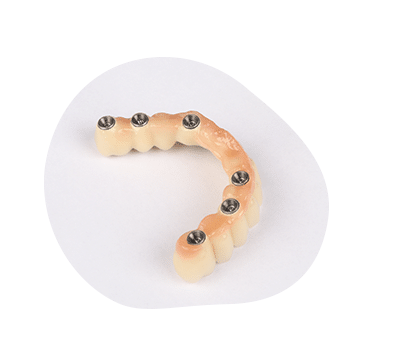
CAN A DENTAL IMPLANT BE A PERMANENT REPLACEMENT FOR LOST TEETH?
Yes, a dental implant can be a permanent replacement for lost teeth. A dental implant is surgically placed into the jawbone and serves as a replacement for the missing tooth root.
After the implant is placed, a dental crown that looks and functions like a natural tooth can be attached to it.
WHEN IS DENTAL IMPLANT PLACEMENT THE BEST OPTION?
- How many of you have perfect teeth but have lost just one tooth?
- The loss of one of the front teeth is very common among young people after a fight or an unfortunate fall. Traffic accidents are also a frequent cause of a single tooth loss.
- Are you struggling with difficult chewing due to the lack of molars or impaired speech?
- Do you have an older facial appearance and wrinkles around your mouth precisely because of missing molars?
- Do you lisp when speaking or mispronounce certain words?
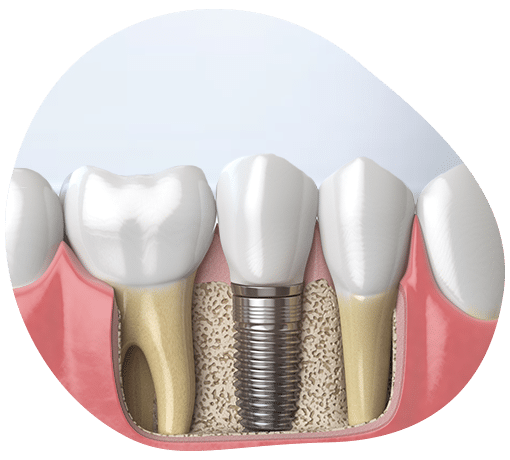

The solution to all the above-mentioned problems is dental implants. The placement of dental implants can resolve the issue of a missing tooth, partial edentulism, or complete edentulism.
BENEFITS – Why get dental implants?
- A dental implant replaces your natural tooth, meaning you will no longer have gaps between your teeth. Implant placement protects adjacent teeth from being filed down, provided they are in good condition.
- The crown (cap) on the implant looks completely natural, like your tooth, and is even stronger, meaning you won't have any issues with chewing.
- Implant placement prevents bone resorption that would certainly occur due to tooth loss, as there is no bone stimulation which normally happens during chewing.
- Implants are made of titanium. As such, they are completely biocompatible with the body. There are no allergies or adverse reactions because of the material's properties.
- The placement of dental implants prevents changes in facial structure, as tooth loss affects facial aesthetics, making you look older. Implants help maintain a natural facial appearance.

WHAT ARE ALL-ON-4 AND ALL-ON-6 TREATMENTS?
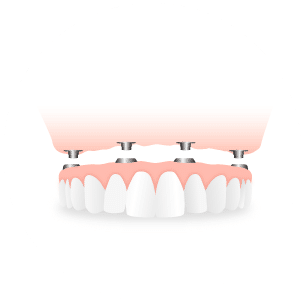
ALL ON 4
All-on-4 consists of crowns placed on just 4 implants per jaw.
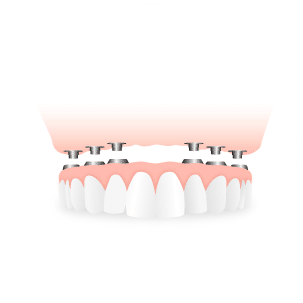
ALL ON 6
All-on-6 also consists of crowns, but on 6 implants, which is much better as the chewing forces are distributed more effectively.
All-on-4 and All-on-6 treatments can feature metal-ceramic or metal-free crowns, either cemented or screwed onto the implants.
Hvala na svemu
Poseban pozdrav za moju Ruźicu i Aleks❤️
S obzirom da je danas 8. 3. 2025., želim kolektivu Up Denta srećan dan žena, nastavite da kidate!🌷Za kraj ovog romana, veliki pozdrav i poljubac za moju doktorku Ružicu i Aleksandru- sestru po satiću! :****
Anastasija Milićević
Doktorka Tanja je pažljivo saslušala kako probleme, tako i želje koje imam, a onda sam dobio jasan plan šta će se raditi. Kada smo krenuli u rad, dato mi je objašnjenje za svaki korak kome se pristupa.
Smatram da doktorka Tanja ima veliku stručnost i preciznost.
Rezultat su nove krunice i desni koje su se vrlo brzo potpuno oporavile.
Prezadovoljan sam!
Veliko hvala celom Up Dent timu! Naravno, hvala i tehnici na odličnoj izradi krunica!
Predani, predusretljivi i uvek nasmejani. Vrhunska strucnost
Hvala Tanji i Up Dent timu❤️🍀
Sjajna i veoma profesionalna atmosfera koja cini da trema nestane.
Dr. Tanja and her team are highly skilled and knowledgeable. They performed a lot of work on my teeth, and I’m returning to the Netherlands with a healthy, beautiful smile.
Dr. Tanja did a fantastic job on my complicated root canals, and the crowns she placed are perfect—I can’t even tell the difference between them and my natural teeth.
Dr.Ružica also did a great job with my teeth whitening. The mild discomfort was well worth the incredible results.
The entire team made me feel comfortable and at ease, which is no small feat as I’m not the most relaxed person when it comes to dental visits. Despite this being the most extensive dental work I’ve ever had, I felt calm and well taken care of throughout.
In short, the UpDent team did an excellent job. I highly recommend them for any dental needs.
✨🩷💙🩵🤍💫
✅ Enterijer je uvek čist i mirisan, ali ne miriše onako usilno na zubara, nego na žensku pedanteriju!
✅ Jasno govore šta rade tako da znate šta vam se sa zubom dešava dok vam je otvorena vilica.
✅ Pažljivo prate svaku grimasu na licu i tačno znaju kada vas nešto boli da odmah reaguju.
✅ Ne pravi vam se bazen u ustima već vam, tokom intervencije, dozvoljavaju da često ispirete usta.
✅ A kada dođe trenutak poliranja zuba, bukvalno prave malo vajarsko delo!
♥️ I uvek ide neka lagana muzika u pozadini, a Jole voli i da zapevuši dok radi da bi vas opustila! Taj momenat mi je najdraži i uvek me nasmeje, iako zevam .. Hvala Jole! 🥹
Možda će zvučati neočekivano, ali ja se doslovno radujem svakoj poseti zubaru od kad sam Jole i Tanju izabrala za čuvare mog oralnog zdravlja! Sačuvale su mi kutnjak od trajnog propadanja, jer jako dobro znaju svoj posao. Pedantno, pažljivo i precizno. 🦷
Can’t wait to see you girls again! 😊
Zahvalna što sam vas otkrila!
HOW DOES THE IMPLANT PLACEMENT PROCEDURE WORK?

It begins with a clinical examination and reviewing an orthopantomogram and a 3D scan. We assess the condition of any remaining teeth (if present), the oral mucosa, and the gums.
The 3D scan accurately shows the amount of bone available for implant placement. It also reveals the proximity of certain anatomical structures to the intended implant site. During the initial consultation, we check for chronic diseases or medication that could be counter-indicated.
Our doctor needs to know about any bad habits or risk factors that may affect the implant placement procedure or postoperative recovery.

After establishing a precise treatment plan with the patient, we proceed with implant placement. The process of placing a single dental implant takes about 20 minutes. It is performed under local anesthesia and is completely painless. The duration of the entire procedure depends on the number of implants. For example, placing 8 implants (All-on-4 for both jaws) takes about 2.5 hours.

You can return to your daily activities the very next day. During the first 7 days, it is recommended to avoid eating hard food at the implant site. After 10 days, the stitches are removed, and you can function as usual.
After implant placement, a 3-month waiting period is required for the implant to integrate with the bone. This ensures that the implants can be loaded with either fixed or removable prosthetics. Immediate loading is possible with temporary prosthetics, followed by definitive work later.
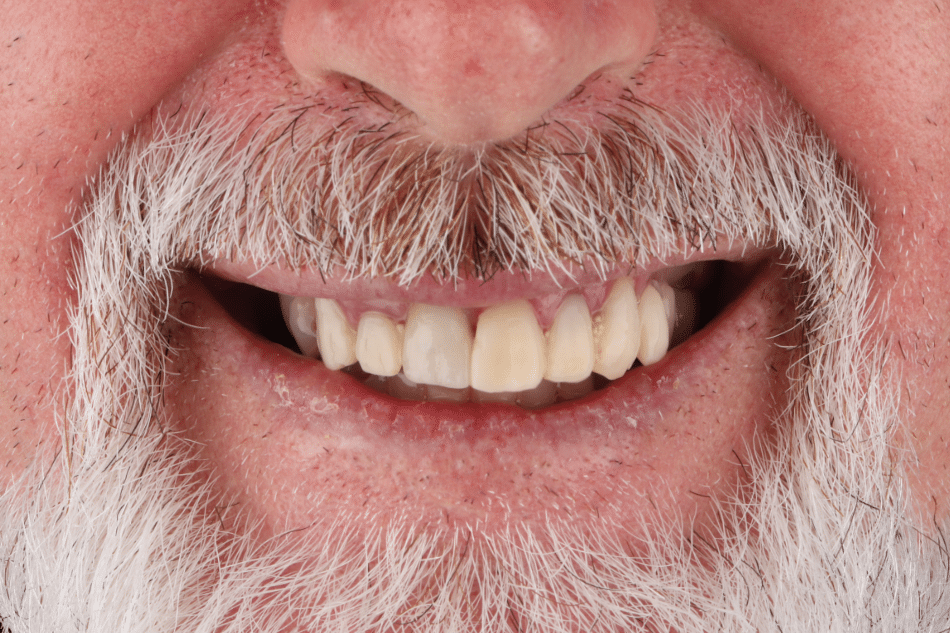
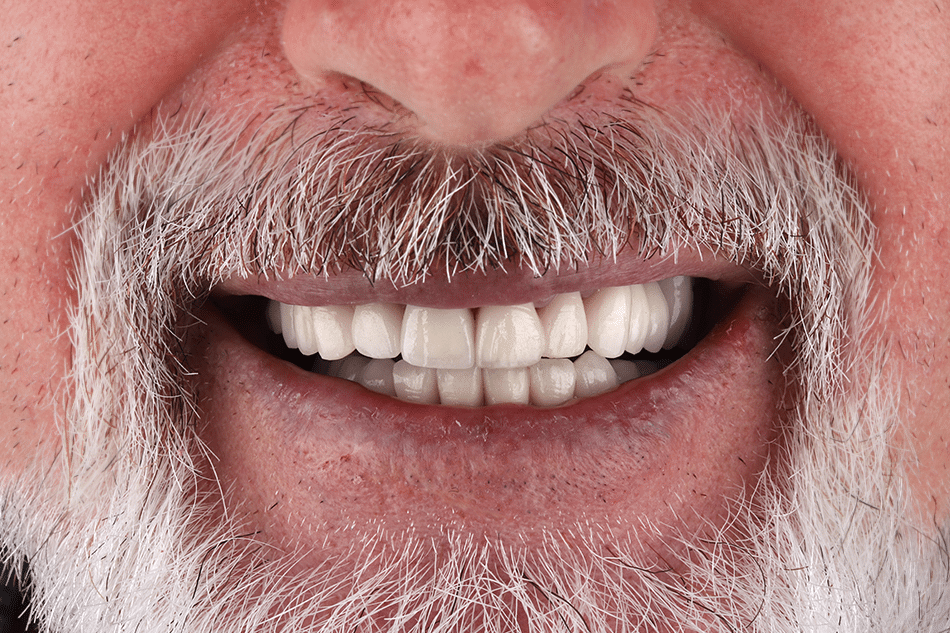
implants placed
star rating on Google
WHAT PREPARATIONS MIGHT BE NEEDED FOR IMPLANT PLACEMENT?
- Tooth extraction – If you have decayed or broken teeth, they may need to be removed to make room for implants.
- Sinus lift – Sometimes a necessary procedure to create space for implants in the upper jaw.
- Bone grafting (augmentation) – Some patients need jawbone reconstruction to support dental implants.

LIFETIME WARRANTY ON DENTAL IMPLANTS
We offer a lifetime warranty on all implants placed at our clinic. As mentioned, we use only premium implants such as Bredent, Straumann, and Nobel Biocare, which are known for providing lifetime warranties on their implant systems.
The warranty is valid under the condition of proper oral hygiene and mandatory check-ups every six months, which are necessary to maintain the longevity of the treatment.
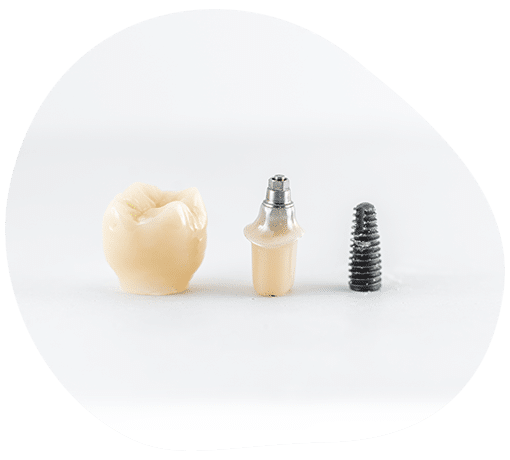
OUR TEAM OF DENTISTS
DENTAL IMPLANTS – PRICING
FREQUENTLY ASKED QUESTIONS ABOUT DENTAL IMPLANT PLACEMENT
What is the success rate of dental implants?
The success rate is 95%, as demonstrated in our clinic.
How should individual implants and All-on-4/All-on-6 treatments be maintained?
Oral hygiene plays a vital role in the longevity of implants. In addition to a toothbrush and toothpaste, a water flosser (waterpik) is highly recommended for implant care.
What is the difference between implant manufacturers, and why are some more expensive?
The difference lies in the design and integration with the bone. The components that attach to the implant (abutments) and support the crowns vary, affecting durability. Established brands like Nobel and Straumann have undergone extensive research, justifying their higher prices.
Are there any counter-indications?
There are very few counter-indications. However, conditions that compromise the immune system, such as cancer, radiation/chemotherapy, or insulin-dependent diabetes, are absolute contraindications. Untreated periodontitis is also a contraindication, while smoking and alcohol consumption are considered risk factors.
Is dental implant placement painful?
NO. Modern implant placement is a routine, painless surgical procedure performed under local anesthesia.
How long does the implant procedure take, and what is the post-operative recovery like?
Placing a single implant takes about 20 minutes. Patients can return to normal activities shortly after. Swelling is common, but pain is minimal compared to tooth extractions. Stitches are removed after ten days.
How do patients adjust to implants?
Patients often feel as if they aren’t chewing with their natural teeth because implants lack periodontal ligaments that provide cushioning. This sensation usually disappears within a couple of weeks after the crown is placed.
Does age matter for implant placement?
Implants are not placed before the age of 18, as jaw growth needs to be complete.
Can dentures be attached to implants?
If implant positioning is unfavorable or there isn’t enough bone for additional implants, overdentures can be used. Although removable, implant-supported dentures provide excellent comfort for speaking and eating, eliminating the issues associated with loose dentures.



